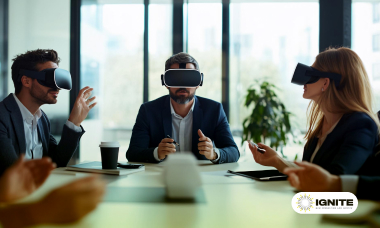
Introduction: In the ever-evolving world of talent acquisition, companies are constantly seeking innovative ways to assess candidates and identify the best fit for their organization. As technology advances, virtual reality (VR) has emerged as a game-changer in the hiring process. VR-based immersive interviews are revolutionizing the way employers evaluate potential hires, offering a more engaging, efficient, and insightful experience for both candidates and recruiters.
Immersive interviews leverage VR technology to create realistic, interactive scenarios that simulate real-world work situations. Candidates don a VR headset and are immersed in a virtual environment where they face challenges, solve problems, and interact with virtual characters. These experiences are designed to assess a candidate's skills, knowledge, and behavior in a context that closely resembles the actual job.
Immersive interviews provide a unique and engaging experience for candidates. Instead of the traditional question-and-answer format, VR allows candidates to showcase their abilities in a more dynamic and interactive setting. This approach not only makes the interview process more enjoyable but also gives candidates a realistic preview of the job, helping them determine if the role aligns with their expectations and career goals.
VR-based assessments minimize the influence of human bias in the hiring process. By presenting standardized scenarios and challenges to all candidates, immersive interviews ensure a level playing field. The VR system objectively records and analyzes each candidate's performance, providing recruiters with data-driven insights into their strengths, weaknesses, and potential fit for the role.
Immersive interviews streamline the hiring process by eliminating the need for multiple rounds of in-person interviews. With VR, companies can assess a larger pool of candidates in a shorter time frame, reducing time-to-hire and associated costs. Additionally, VR interviews can be conducted remotely, eliminating travel expenses and enabling companies to reach a wider talent pool.
VR technology allows companies to create highly realistic simulations of the work environment and job responsibilities. This enables candidates to experience a day in the life of the role they are applying for, giving them a better understanding of the challenges and expectations. By providing a realistic job preview, immersive interviews help candidates make informed decisions about their fit for the position, reducing the likelihood of turnover due to misaligned expectations.

Soft skills, such as communication, problem-solving, and adaptability, are crucial for success in many roles but can be difficult to evaluate through traditional interviews. Immersive interviews allow companies to observe candidates' soft skills in action. For example, a VR scenario might require a candidate to collaborate with virtual team members to solve a complex problem, providing insights into their communication and teamwork abilities.
VR technology enables companies to create industry-specific simulations that closely mirror real-world challenges. For instance, a construction company might use VR to assess a candidate's ability to identify safety hazards on a virtual job site, while a healthcare organization could simulate a patient care scenario to evaluate a candidate's bedside manner and clinical decision-making skills.
Immersive interviews are particularly valuable for assessing leadership potential. By placing candidates in virtual leadership roles, companies can observe how they handle high-pressure situations, delegate tasks, and motivate virtual team members. This approach provides a more comprehensive evaluation of a candidate's leadership capabilities compared to traditional interviews.
Implementing VR-based immersive interviews requires a significant investment in hardware, software, and training. Companies must ensure that their recruitment teams are well-versed in using the technology and that candidates are comfortable navigating the virtual environment. Additionally, companies must consider the accessibility of VR technology for candidates with disabilities and provide alternative assessment methods when necessary.
As with any new technology, there are ethical considerations surrounding the use of VR in talent assessment. Companies must ensure that their VR simulations are fair, unbiased, and do not discriminate against any protected groups. They must also be transparent about how candidate data is collected, stored, and used, and obtain proper consent from participants.
While immersive interviews offer numerous benefits, it is essential to strike a balance between technology-driven assessment and human interaction. VR should complement, rather than replace, traditional interview methods. Companies should still provide opportunities for candidates to interact with recruiters and hiring managers in person, allowing for a more comprehensive evaluation of cultural fit and interpersonal skills.

As VR technology continues to advance, the possibilities for immersive interviews are boundless. In the near future, we can expect to see:
Advancements in VR hardware and software will enable even more realistic and immersive simulations, providing a more accurate representation of the work environment.
VR interviews may be tailored to each candidate's unique background, skills, and career goals, creating a more personalized and engaging assessment experience.
Combining VR with artificial intelligence (AI) could enable real-time adaptation of simulations based on a candidate's performance, providing a more dynamic and targeted assessment.
As remote work becomes more prevalent, VR could facilitate virtual group interviews and assessments, allowing candidates to collaborate with potential colleagues from around the world.
Immersive interviews are transforming the landscape of talent assessment, offering a more engaging, efficient, and insightful approach to evaluating candidates. By leveraging VR technology, companies can create realistic simulations that assess a candidate's skills, knowledge, and behavior in a context that closely resembles the actual job. While there are challenges and considerations to address, the potential benefits of immersive interviews are significant.
As technology continues to evolve, we can expect to see even more innovative applications of VR in the hiring process. By embracing this transformative approach to talent assessment, companies can gain a competitive edge in attracting, evaluating, and retaining top talent in an increasingly digital world.
---
This article explores the emerging field of VR-based talent assessment and its implications for the future of hiring. For more insights on HR technology and talent management, visit our resources section.


